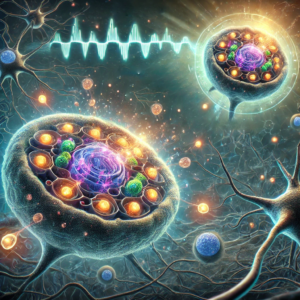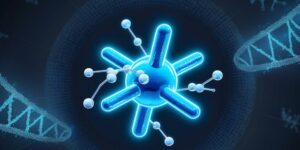The mTOR Protein — a Central Regulator of Healthspan and Aging?

A molecule that senses nutrients is linked to healthspan and aging: Image by Gerd Altmann.
- How mTOR senses nutrients gives new hope for healthspan and aging research.
- mTOR IS involved in nutrients, proteins, cell cleanup, energy, and cellular health.
- Rapamycin (Rapa) may lessen mTOR activity and improve healthspan in people.
- What we eat affects mTOR activity. Nutrient-dense foods may promote healthy aging.
How Food Influences Healthspan and Aging
There is a lot of cell research going on in pursuit of understanding and improving healthspan and aging. In this study, the focus is on the protein called mTOR, which acts like a boss giving orders inside your cells. One of its functions is to keep a close check on food levels, especially nutrients. Think of mTOR as a vehicle’s fuel gauge. Based on how much is in the tank, mTOR tells cells how fast to grow and when they need to repair themselves.
Staying with the vehicle analogy, mTOR is like an on-site mechanic whose job is to keep cells running optimally. So, could a better understanding of mTOR be the key to staying healthy for longer? Scientists think it may be part of the anti-aging puzzle.

Healthspan, Aging, and Rapamycin
Scientists know that blocking the mTOR protein with rapamycin improves the healthspan and aging in animals. Trials have shown this in diverse lifeforms such as yeast, worms, fruit flies, and mice. Obstructing mTOR seems to put cells into an energy-saving mode that forces them to self-repair. This mode has cells getting rid of damaged and aged parts. Keeping the cells in tip-top condition may be the reason behind longer life spans. For instance, Rapa extended the lifespan of mice even when treatment started later in life. These findings are truly exciting. They imply that tweaking mTOR could be a new way to help people stay healthier for longer.
Regulation and Functions of mTOR Pathway
The mTOR protein acts as a control center inside the body. It responds to signals from the things you eat, like amino acids, as well as hormones. These signals give two clear messages to cells depending on what needs doing. One message instructs your cells to focus on building and repairing (the growth mode). The other tells cells it’s time to clean up any unwanted junk like damaged or aging parts (the cleanup mode).
Challenges and Opportunities
The mTOR protein sounds incredible, and in many ways, it is, but it’s not all good. Studies have shown that, in some cases, it can actually act as a “brake” on lifespan. This “breaking” occurs when mTOR becomes too active, which can speed up aging and shorten lifespan.
Why Hyperactive mTOR Causes Cell Chaos
Keeping things tidy: Healthy cells break down old, unwanted proteins to make way for new ones. Overactive mTOR upsets this cycle.
Cell cleanup: Cells have a cleaning process (autophagy) to get rid of junk. Overactive mTOR throws a wrench in this as well.
Energy problems: The powerhouses of your cells (mitochondria) stop working as they should when mTOR is overactive.
Stuck cells: Cells divide and grow to repair broken parts. Overactive mTOR stops this and even releases harmful junk.
Stem cell slowdown: Stem cells produce healthy cells to replace unhealthy ones. Overactive mTOR makes them much less effective in their ability to renew and repair tissues.
Now you can see how obstructing or reducing mTOR activity and its related proteins has a reverse effect. Studies have already shown this in organisms like yeast, worms, and fruit flies. In yeast, getting rid of something called SCH9 (a protein that works with mTOR) saw it live longer. There have been similar results in worms and flies just by blocking parts of the mTOR pathway. In mice, scientists used rapamycin to obstruct mTOR.
Again, the result was extended lifespans. The takeaway from all this is that mTOR plays a major role in controlling how long organisms live. Dialing down its activity looks promising for extending healthspan and aging across species.
This table sums up the amazing results of Reducing mTOR function and Lifespan Extension.
| Organism | Method of mTOR Inhibition | Lifespan Extension |
|---|---|---|
| Yeast | Turning off the SCH9 protein | Significantly increased lifespan |
| Worms (C. elegans) | Depletion of TOR activity (the cell’s manager). Depletion of RAPTOR activity (TOR’s assistant). | Extended lifespan (both models) |
| Fruit Flies (Drosophila) | Turning off TOR with special tools, i.e., suppressors, inactive forms. | Similar extended lifespan seen |
| Mice | Blocking mTOR with rapamycin | Extended lifespan, especially with treatment started later |
mTOR and Dietary Restriction
Scientists are exploring how eating less (dietary restriction) could help us live longer. They’re especially looking at the role mTOR plays in how the cells use food. It seems that eating less slows down mTOR activity. Likewise, eating more food more often has the reverse effect. So, it seems likely that calorie restriction helps some animals live longer. Understanding how to live longer is even more crucial now that life expectancy is going down in many countries.
Food Checker: How Your Body Knows When to Build!
Amino acids are like master LEGO bricks for the body. They signal certain building blocks (in this case, mTORC1) on how much they must grow. It’s like a sensor for nutrient availability, managing how cells use and produce energy. You get a variety of amino acids by eating a well-balanced diet. When present, it’s like a green light going off, telling the building boss (mTORC1) to grow cells. So, mTORC1 adjusts cell activity based on the amount of available nutrients. It’s why nutrient-dense foods are so important in our diet.
The Cellular Pause
The cells in your body sometimes hit a pause button and stop dividing. The name for this process is cellular senescence, and mTOR has a big role in it. Once again, it’s an issue triggered by an overly active mTOR protein. The paused cells get agitated and release unwanted cell junk that can shape how we age and get disease.
You may have figured out the solution to this bodily crisis already. Blocking or obstructing mTOR reduces the secretion of cell junk. That should return cells to optimal functioning, improving healthspan and aging outcomes.
Implications and Future Research
Blocking mTOR seems like it could help people not only live longer but stay healthier as they age. But, longevity is only sought if it combines with a decent quality of life. Scientists still need to figure out how obstructing mTOR works and any potential downsides. With every new study comes new hope, and the research is ongoing. We’re much closer now to grasping how mTOR interacts with other things in cells that affect healthspan and aging.

Conclusion
Reducing mTOR activity seems the likely path to improve healthspan and aging. Scientists are learning more about the mTOR protein and how it affects the way cells work. This knowledge could hold the key to healthier aging for us all and maybe other living things, too, like pets.




